15 Physical Therapy Exercises For Tennis Elbows: A Step-By-Step Guide
Effective and easy exercises to prevent and minimize that excruciating pain in your elbow.

Image: ShutterStock
Tennis elbow exercises can help alleviate the excruciating pain you feel. In lateral epicondylitis (tennis elbow), tendons and muscles joined to the elbow are injured due to repetitive use of the forearms, wrists, and arms. The condition is also exacerbated when lifting light objects. If your arm or wrist hurts, stop moving them first. You should then begin doing exercises to restore, rebuild, and strengthen the elbow tendons and muscles. Tennis elbow exercises can relieve inflammation and get you back on track by ending the reoccurrence of the condition. Here are 15 exercises that you can do to relieve your pain. Take a look.
 Workout Blueprint: Exercises For Tennis Elbow
Workout Blueprint: Exercises For Tennis Elbow- Frequency: Daily
- Benefits: Reduce inflammation and pain and strengthen elbow muscles and tendons.
- Equipment Needed: 1-2 pounds dumbbells, towel, sponge ball, resistance band.
- Space Required: Small area
- Assistance Required: Yes, for certain exercises.
- Who Should Avoid: Anyone who experiences extreme pain or discomfort during these exercises.
In This Article
What Causes Tennis Elbow?
Here are some common causes for tennis elbow (1):
- Repetitive twisting of your forearm
- Activities that involve repeated bending of the elbow, such as playing violin
- Repeated use of hand tools like scissors or gardening shears
- Using plumbing tools
- Activities that involve repetitive wrist movements, such as typing or using a computer mouse
- Playing racket sports like tennis, squash, or badminton
- Using improper technique while using equipment
- Weak forearm muscles
- A previous injury to your forearm or elbow
- Genetic predisposition
While medication and resting may help relieve pain, certain exercises may also help reduce swelling, speed up recovery and prevent recurrence. Check them out in the next section.
Top 15 Exercises For Tennis Elbows
1. Wrist Curls
Wrist curls are extremely helpful
in reducing tennis elbow pain. They work on the forearm muscles and the tendons. This exercise is easy and can be performed at home or office. Here are the steps.
How To Do
Step 1 – Place your right forearm on a table, with your hand hanging over the edge of the table, and your palm facing the ceiling.
Step 2 – Place a 1-pound weight in your hand.
Step 3 – Carefully raise and lower the weight without moving your forearm from the table.
Step 4 – Repeat this 10-12 times.
Step 5 – Repeat the above steps with your left hand.
Precaution
Make sure not to use a weight of more than 1-2 pounds. Using a weight of more than 2 pounds may aggravate the pain.
Tip
If you don’t have weights, you can fill water in a bottle and use it.
 Quick Tip
Quick Tip2. Wrist Turn
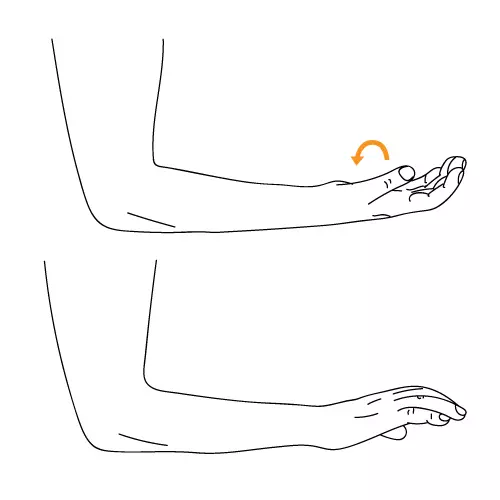
This is a very convenient exercise as you can do it at any time of the day, and anywhere! Here is how to do it.
How To Do
Step 1 – Bend your left elbow at 90 degrees with your palm facing upwards.
Step 2 – Slowly turn your wrist towards the right, and let your palm face downwards.
Step 3 – Hold for 5 seconds and slowly release.
Step 4 – Do this 10 times.
Step 5 – Repeat the above steps with your right hand.
Precaution
Do not repeat this exercise more than 10 times.
Tip
This exercise will also help you relieve anxiety.
Do it with both the hands and start downward to upward. Hold and count the 5 seconds with your palm upward.
3. Wrist Flex

Here is how you should do it.
How To Do
Step 1 – Stretch your right arm in front of you, with your palm facing down.
Step 2 – Cusp your right hand fingers with your left hand and gently press it down.
Step 3 – Hold for 15 seconds. Pull your wrist up.
Step 4 – Hold for 15 seconds and then release.
Step 5 – Repeat this with your left hand.
Precaution
Do not pull up or push down your wrist too hard to prevent further injury.
Tip
In case of severe injury, keep your hands dangling over the edge of the table and then do the wrist flex exercise.
4. Fist Clench
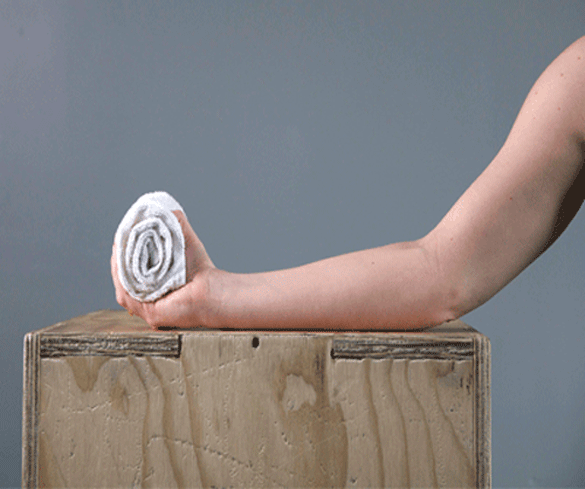
This is a forearm strengthening exercise that can also help relieve a tennis elbow. Here is how to do it.
How To Do
Step 1 – Roll a towel and hold it in your right hand.
Step 2 – Place your right hand on a table.
Step 3 – Now, gently squeeze the towel and hold it for 10 seconds.
Step 4 – Release and repeat 10 times.
Step 5 – Repeat the steps with your left hand.
Precaution
Do not hold the towel too tight to prevent injuries.
Tip
You can also perform this exercise with a soft ball.
 Quick Tip
Quick Tip5. Wrist Deviation
Wrist deviation is one of the wrist and forearm exercises that will help strengthen the muscles and tendons. Here is how you can do it.
How To Do
Step 1 – Place your right hand on a table with your palm over the edge.
Step 2 – Hold out your hand like you are going to shake hands with someone.
Step 3 – Now, move your wrist up and down.
Step 4 – Repeat this 10-12 times.
Step 5 – Repeat the above steps with your left hand.
Precaution
Be gentle when you do this exercise to prevent further wear and tear in the tendons attached to your wrist bones.
Tip
You can hold a spoon with your hand while doing this exercise to support your hand.
6. Towel Twist
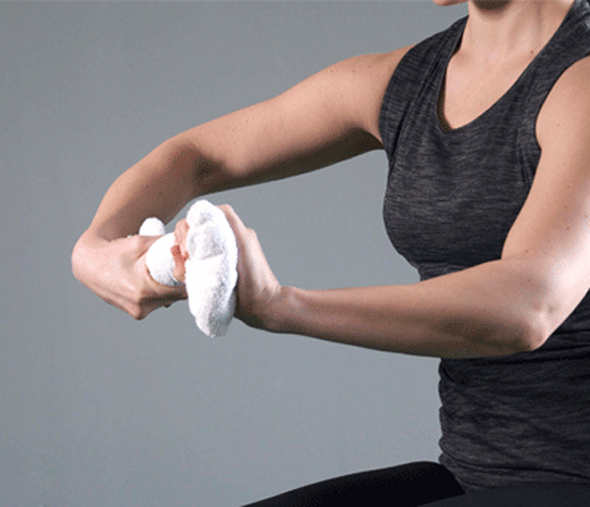
This is a strengthening exercise that works on the wrist extensors and wrist flexors. Follow these steps to do it correctly.
How To Do
Step 1 – Sit on a chair and hold a towel with both your hands. Ensure your shoulders are relaxed.
Step 2 – Twist the towel with both your hands in opposite directions as if you are trying to wring it.
Step 3 – Hold it for 3-5 seconds.
Step 4 – Repeat this 10-12 times.
Precaution
Avoid wringing the towel too hard.
Tip
You can use a sponge towel to do this exercise.
7. Supination With Dumbbell
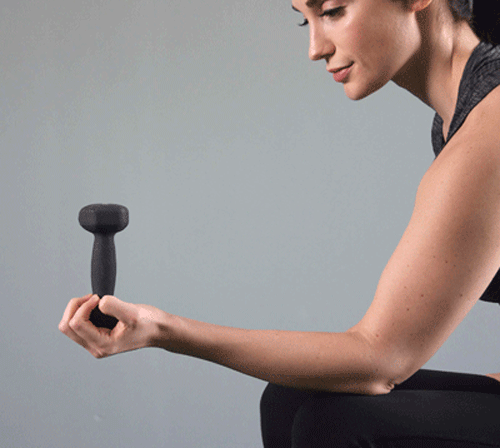
The supinator muscle helps you to turn your palm upwards. It is also the muscle that is the most affected in a tennis elbow injury. This is an effective injury rehabilitation exercise to relax and strengthen the supinator muscle.
How To Do
Step 1 – Sit on a chair, rest your elbow on your knee, and hold a 1-pound dumbbell vertically in your hand.
Step 2 – Rotate your wrist and turn your palm up.
Step 3 – Rotate your wrist again and bring your palm down.
Step 4 – Repeat this 15-20 times.
Step 5 – Repeat these steps with your other hand.
Precaution
Make sure you use a dumbbell that does not weigh more than 1-2 pounds.
Tip
You can rest your hand on a table while doing this exercise.
8. Ball Squeeze
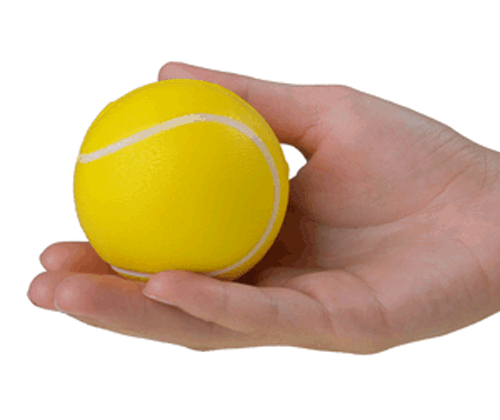
This is an excellent exercise to get your muscles and tendons working properly again. It helps to strengthen the muscles involved in the movement of the wrist. Here is how to do it.
How To Do
Step 1 – Sit on a chair and hold a sponge physiotherapy ball in the affected hand.
Step 2 – Squeeze it and hold it for 3 seconds. Release.
Step 3 – Repeat 10 times.
Precaution
Make sure not to overdo this exercise to prevent injury.
Tip
You can also perform this exercise while you are standing.
9. Bicep Curls

This is an excellent way to strengthen your biceps and the muscles near the elbow. Here is how to do it.
How To Do
Step 1 – Sit with your legs spread and your right elbow on your right thigh.
Step 2 – With your forearm horizontal to your thigh, hold 1-2 pounds weight.
Step 3 – Slowly bring the weight towards your chest.
Step 4 – Repeat this 10-12 times.
Precaution
Do not overdo it or use heavy weights.
Tip
You can use a bottle filled with water to perform this exercise.
10. Elbow Bend

The elbow bend is a relaxing exercise and helps to release the tension around your elbow and forearms. Here is how you should do it.
How To Do
Step 1 – Stand straight with your legs shoulder-width apart.
Step 2 – Slowly bend your elbow and move your arms upwards to touch your shoulder.
Step 3 – Hold for 10-15 seconds.
Step 4 – Slowly lower them.
Step 5 – Repeat this 10 times.
Precaution
Avoid doing it at a fast pace.
Tip
If you have recovered about 90%, you may use a 1-pound weight.
11. Drawing The Sword
This is a resistance band exercise for elbow pain and tennis elbow. It works on your triceps, shoulders, wrist flexors, and forearm muscles. Here are the steps to do it correctly.
How To Do
Step 1 – Hold one edge of the resistance band with the feet on the uninjured elbow side.
Step 2 – Hold the other end with the hand affected by tennis elbow.
Step 3 – Imagine you are drawing a sword, and pull the resistance band up and outwards.
Step 4 – Repeat this 10 times.
Precaution
Do not rush this exercise.
Tip
You can buy the resistance band online at great discounts!
Tony Bapuji, a lifestyle blogger, shares how he manages tennis elbow. He writes, “My first physiotherapist gave me some exercises with a resistance band. These worked at first. I also got relief by wrapping my elbow in a small, damp tea towel heated in a microwave (i).” However, he did not keep up with it diligently and it eventually did not work out for him. Now he has turned to isometric exercises, shoulder strengthening with dumbbells, and wrist and bicep curls.
This shows that one might have to try a few different combinations of exercise to see what works for their specific case of tennis elbow.
12. Tricep Stretch
This is a good rehabilitation exercise for an elbow injury. Here is how you should do it.
How To Do
Step 1 – Bend your elbow and pull your arm up and backward.
Step 2 – Use your other hand to place it on your injured elbow. Apply gentle pressure on it and pull it backward.
Step 3 – Hold it for 5 seconds and release.
Step 4 – Repeat this 10 times.
Precaution
Avoid putting too much pressure.
Tip
You may use weights if you have recovered about 80-90 %.
13. Finger Extension
This is a simple yet great exercise to strengthen your wrist, forearm, elbow, and arm muscles. Here is how to do it correctly.
How To Do
Step 1 – Make a beak shape with your fingers.
Step 2 – Place a rubber band over the finger to hold them together.
Step 3 – Now move your fingers inward and outward.
Step 4 – Repeat this 10 times.
Precaution
Do not rush this exercise or overdo it.
Tip
Use a broad rubber band for better support.
14. Isometric Wrist Extension
are also great for treating tennis elbow. You need a partner for this elbow strengthening exercise. Here are the steps.
How To Do
Step 1 – Position your forearm at a right angle to your arm, with your palm facing down.
Step 2 – Ask your partner to place his/her palm over yours.
Step 3 – Now, force your palm upwards and let your partner resist that force by applying downward pressure on your palm.
Step 4 – Hold it for 5-7 seconds and then release.
Step 5 – Repeat this 10 times.
Precaution
Do not put too much pressure or force while doing this exercise.
Tip
You can also place your hand underneath a table and perform this exercise.
15. Partner Tennis Elbow Stretch

Last, but not the least, this elbow stretching exercise will help strengthen the tendons and muscles around your elbow and forearms. Here is how to do it. If you attend physical therapy for tennis elbow, you can ask your physiotherapist to help you complete this exercise.
How To Do
Step 1 – Lie down and place your arm to the side.
Step 2 – Rotate your arm inward.
Step 3 – Now, take the help of your partner to flex your wrist downward.
Step 4 – Hold it for 10-20 seconds.
Step 5 – Repeat this 10 times.
Precaution
Be gentle on your wrist and do not overdo it.
Tip
Do this exercise 3 times a day for better results.
It is important to understand the significance of proper technique and form before starting any of these exercises. Proper form ensures that you are focusing on the appropriate muscles and tendons, not overstretching your elbow joint, and lowering the possibility of further injury. Improper technique may worsen the condition, resulting in additional pain and a slower rate of healing. You can increase the efficiency of each workout and encourage healing by concentrating on controlled movements, maintaining proper posture, and utilizing the proper amount of resistance.
Caution: Many people get confused between golfers and tennis elbow issues. Do not practice golfers elbow exercises to treat a tennis elbow issue without consulting your doctor or physiotherapist first. Similarly, avoid using tennis bursitis exercises or tennis tendonitis exercises to manage a tennis elbow issue.
Infographic: Top 7 Physical Therapy Exercises For Tennis Elbow
Lateral epicondylitis or tennis elbow is inflammation in tendons and muscles associated with the elbow that occurs due to constant use of the forearms and wrists. It can also occur while lifting weights during training. However, there are exercises that can help alleviate the pain and restore normal function. The following infographic contains the top 7 exercises that may be especially beneficial for it. Take a look!

Illustration: StyleCraze Design Team
Tennis elbow can cause excruciating pain and make it difficult to perform simple daily tasks. The repetitive wrist and arm motions overload the elbow’s tendons, causing pain and inflammation. The exercises discussed in this article help strengthen the elbow tendons, forearm and elbow muscles, wrists, wrist extensors, and flexors. These can also be used as elbow range of motion exercises as they improve elbow and forearm flexibility. The key here is to do them slowly and carefully so that you don’t worsen the condition of your elbow by exercising indiscriminately. If you feel intense pain while doing any of these exercises, stop doing it immediately and consult a physiotherapist for tennis elbow therapy. Maintain consistency and practice caution for effective and timely results. All the best!
Frequently Asked Questions
What exercises should I avoid with a tennis elbow?
Avoid any movement that can strain your elbow flexors. For instance, you should take a break from barbell curls, chin-ups, or bench presses. Instead, opt for wrist-strengthening exercises like wrist curls, rolls, and stretches to strengthen your wrist and forearm muscles slowly.
Are push-ups okay with tennis elbow?
No. Doing push-ups with a tennis elbow is not advisable as it can further aggravate your injury.
Can I continue to lift weights with a tennis elbow?
Yes. You can continue to lift weights with a tennis elbow as long as you ensure that it doesn’t strain your elbow and is pain-free.
Key Takeaways
- Tennis elbow occurs due to the overuse of the wrists, arms, and forearms.
- Stretching, strengthening, and isometric exercises help relieve inflammation and improve the condition.
- Exercises like wrist curls, wrist turn, and wrist flex help relax and heal your forearm muscles and reduce pain.
Discover the 5 best exercises for tennis elbow! Click on this informative video to help get relief from the pain caused by this condition.
Personal Experience: Source
StyleCraze's articles are interwoven with authentic personal narratives that provide depth and resonance to our content. Below are the sources of the personal accounts referenced in this article.
i. Tennis Elbow and I don’t even play tennis!https://medium.com/@tonybapuji/tennis-elbow-and-i-dont-even-play-tennis-cce40bc7f028
References
Articles on StyleCraze are backed by verified information from peer-reviewed and academic research papers, reputed organizations, research institutions, and medical associations to ensure accuracy and relevance. Read our editorial policy to learn more.
- Tennis elbow
https://www.nhs.uk/conditions/tennis-elbow/
Read full bio of Dr. Sudhansu Singh
Read full bio of Charushila Biswas
Read full bio of Ravi Teja Tadimalla
Read full bio of Payal Karnik






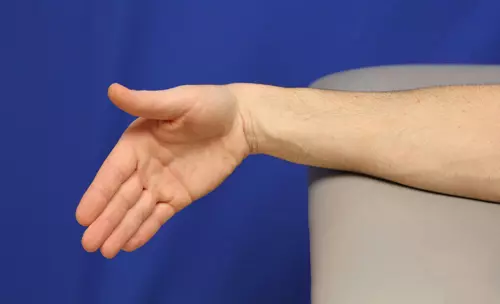
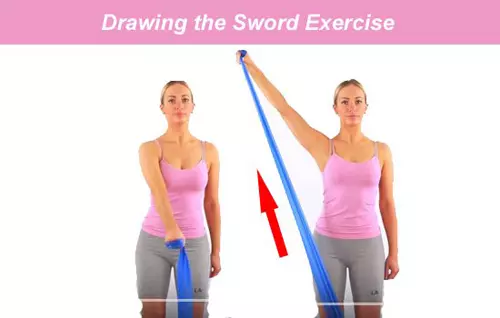

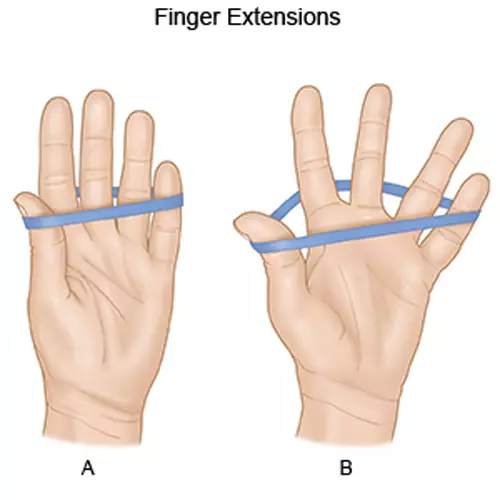











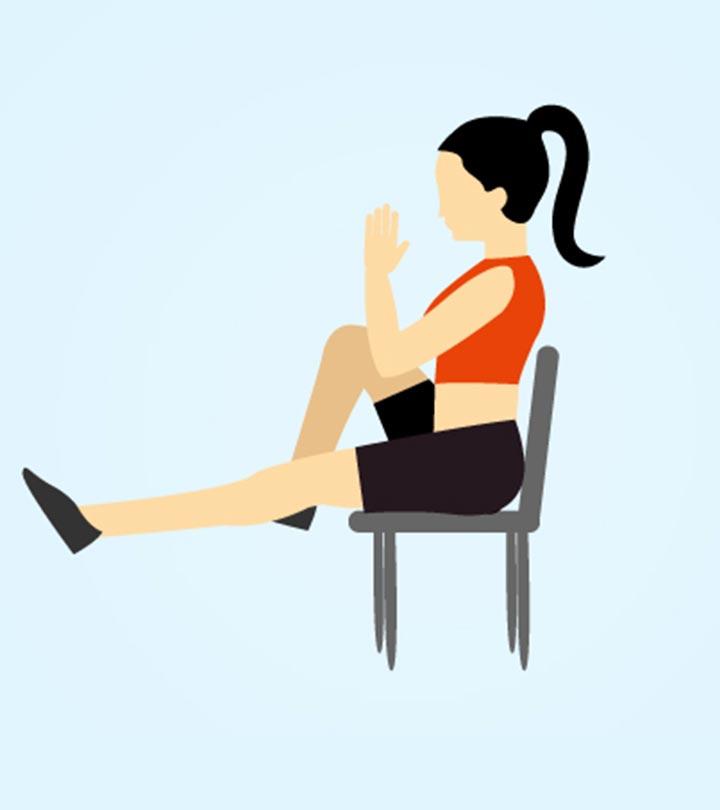
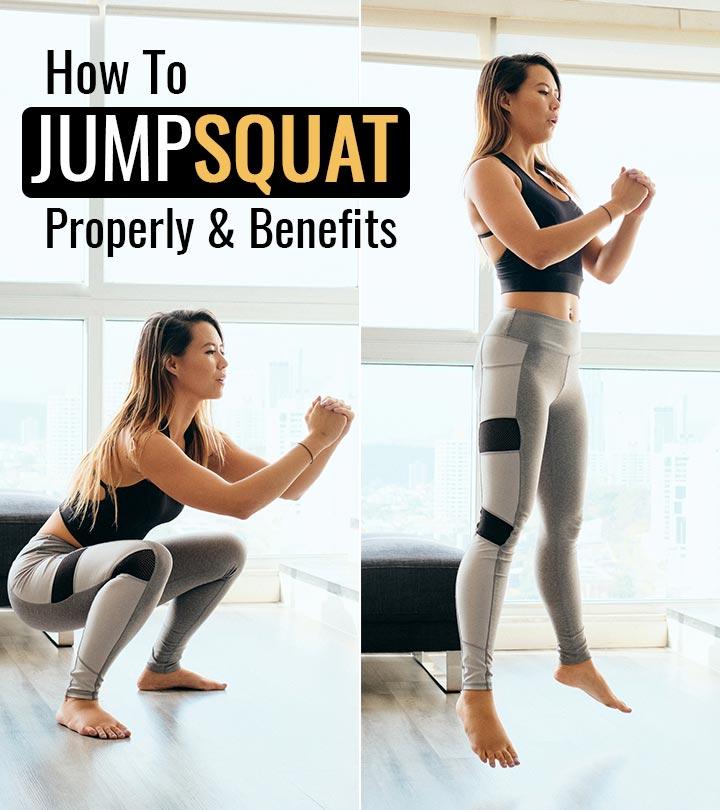


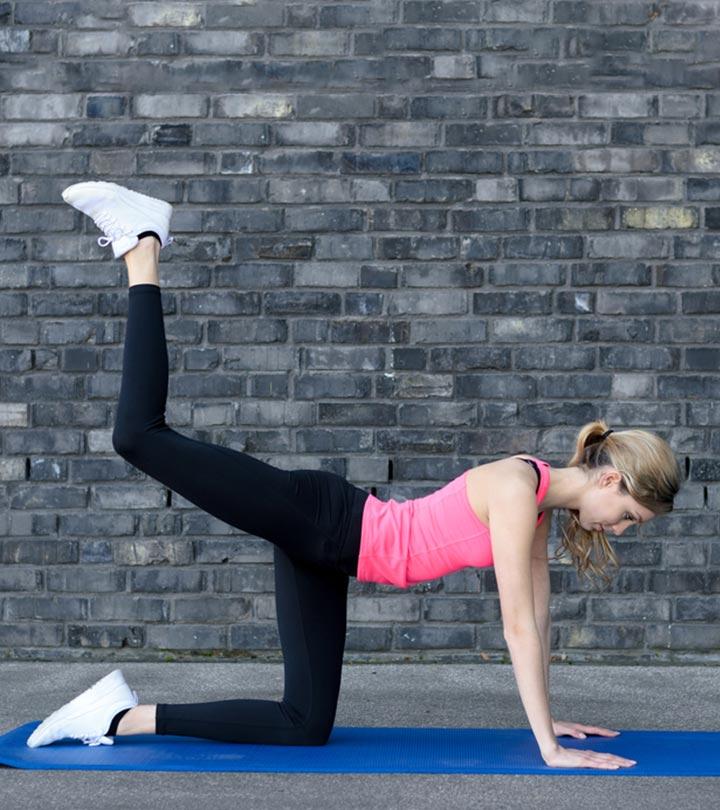



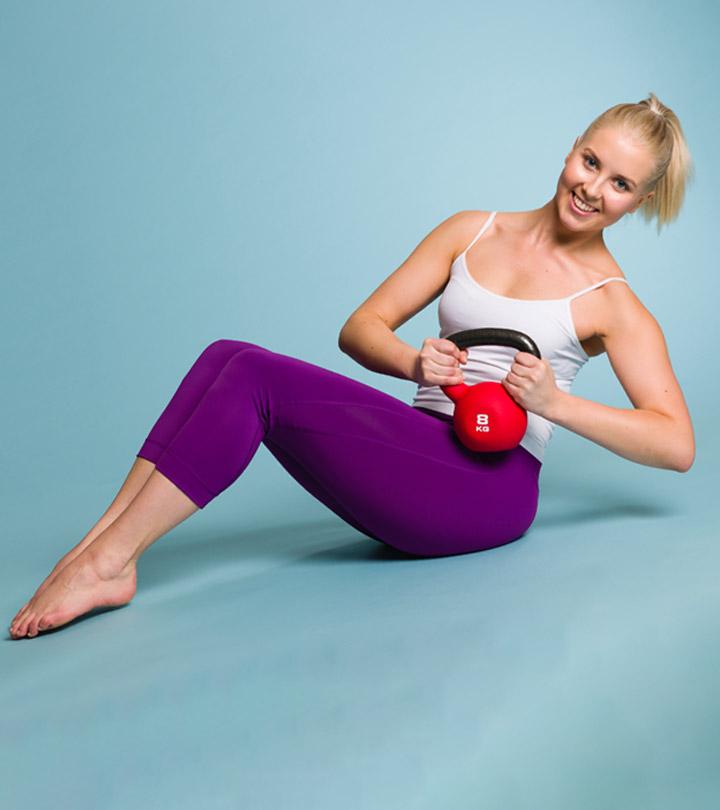
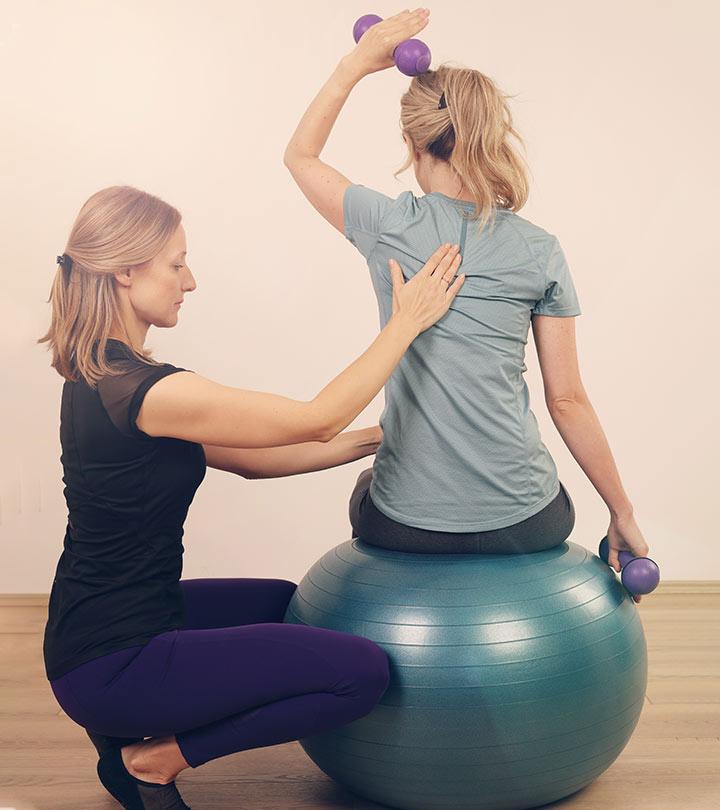
Community Experiences
Join the conversation and become a part of our empowering community! Share your stories, experiences, and insights to connect with other beauty, lifestyle, and health enthusiasts.